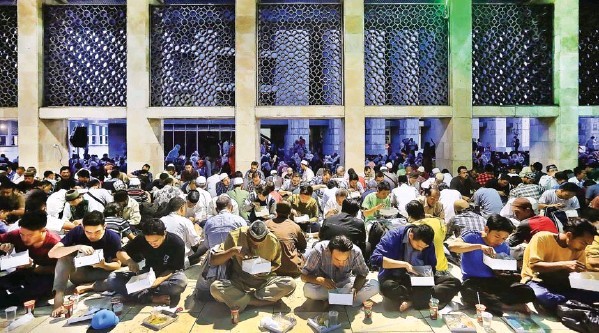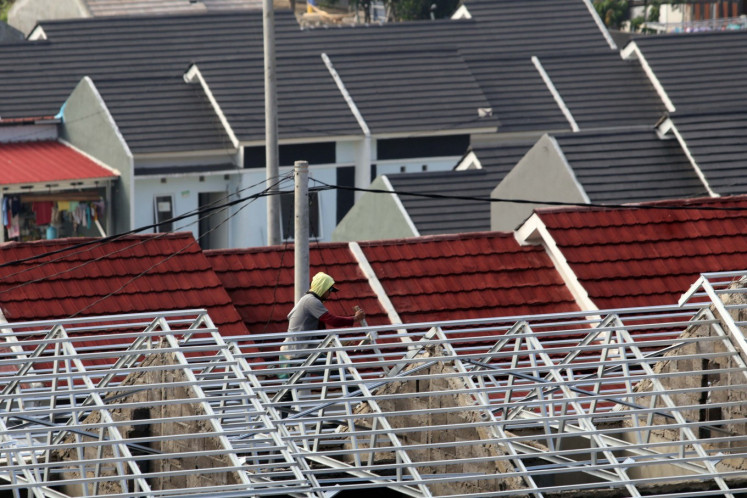Popular Reads
Top Results
Can't find what you're looking for?
View all search resultsPopular Reads
Top Results
Can't find what you're looking for?
View all search resultsExpatriates enjoy Ramadhan traditions
Change text size
Gift Premium Articles
to Anyone
A
s a country with the largest Muslim population in the world, Indonesia offers a variety of rituals, as well as livelier celebrations, for Muslim expatriates, including British Ambassador to Indonesia Moazzam Malik, during the fasting month of Ramadhan.
To Malik, who has been representing the UK in this country since 2014, this will be the second fasting month spent among Indonesians, who have many special traditions during Ramadhan, such as holding breaking-of-the-fast events with large numbers of family and friends, regardless of religion.
The events are better known as buka bersama, — or bukber for short — which means breaking the fast together. “Ramadhan is a much bigger part of social, cultural and political life [in Indonesia]. This means you have a shared experience that brings people together, Muslim and nonMuslim,” Malik told The Jakarta Post on Monday. “That makes Ramadhan much more fun.”
Fasting in Indonesia also allows him to focus more on going without food and drink or intemperate thoughts and actions throughout the day, which is the purpose of the fast, “rather than struggling with sleep deprivation”, he added.
This is because the length of the fast in Indonesia is around 13 hours, much less than fasting in the UK at this time of year, which can last 18 or 19 hours.
In this year’s Idul Fitri festivities, Malik hopes that he will be able to visit some kampung in the capital to witness large groups of people across the city flocking to mosques to perform together their Idul Fitri prayers, which mark the end of the fasting month.
Moreover, he is also looking forward to eating the many Indonesian delicacies that usually appear only during Ramadhan, such as kolak pisang — steamed banana cooked in coconut milk and brown sugar.
“I enjoy dates in Ramadhan as well, as Muslims do all over the world,” Malik said.
“I’ll be balancing commitments at work and in my professional life, as well as finding time to reflect on the meaning of Ramadhan and spending time with family,” he added.
Indonesian culinary richness also has a special resonance at Ramadhan for Peter Szilagyi, a Hungarian who converted to Islam in 2012.
“For me, the most special thing during Ramadhan is the culinary richness. It’s hard to control myself, not eat too much at evenings during Ramadhan,” said Szilagyi, laughing.
“I also love ngabuburit, in which we get together with friends or family, or sometimes even with strangers. It’s a nice custom, which I usually miss when I’m in Europe.”
Ngabuburit is a term taken from the Sundanese language that means a tradition of engaging in activities to pass the last few hours before the breaking of the fast. People in the capital usually do sports or hang out in shopping malls.
As a convert, also known as a mualaf, Szilagyi finds it easier to perform the fast in Indonesia rather than in his home country because the fasting month is so well publicized here. Furthermore, it is rare to find people eating or smoking while on the road during Ramadhan.
However, Szilagyi added, Jakarta also presented a different challenge for those who are fasting, with its notorious traffic jams, which are likely to provoke drivers like him into a rage.
“[In this year’s Ramadhan] I would like to be able to spend more time reading the Koran, as well as thinking about the past year,” said Szilagyi, adding that he also planned to spend the last two weeks of Ramadhan in Lombok, West Nusa Tenggara, to experience more traditional Indonesian ways of celebrating the special month.(dmr)










